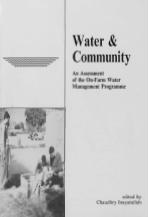 |
The
crisis in water management in Pakistan has been recognized for quite
some time now. The country irrigation system is insolvent, requires a
continuous infusion of financial resources, and its management is widely
seen to be arbitrary and corrupt. Also, there are no formal linkages
between water management and agricultural development. Finally,
increasing environmental degradation (prominent in which are the
problems of waterlogging and salinity) and emerging water scarcity have
put the system under a great deal of stress.
Clearly, for an agrarian
country like Pakistan, these issues are absolutely critical, a question
of survival. Any break in the system will threaten the food security of
the population, especially that of vulnerable groups.
Different
actors in the water management and agrarian scene have suggested a
number of solutions, depending on their background and interests. The
most common suggestion -one might say that this is, in fact, almost a
fetish – is for increased investment in infrastructure. Others say that
what we need is organizational reform. Given the recent enthusiasm for
private enterprise, a growing number of yet others suggest that the key
to greater efficiency in the management of water and agrarian production
lies in the privatisation of hitherto public resources. Finally, those
who have made great gains in other areas through community development
insist that the only sustainable solution lies in building the capacity
of communities to collectively and responsibly manage their affairs.
None of these solutions
are entirely irrelevant. There is some truth in each of them.
Unfortunately, there has been little recognition of this basic holistic
truth, and the different actors have worked at cross-purposes to each
other. There is now an urgent need to bring together and synthesis these
various perspectives and solutions.
It was to make such
a synthesis and collaboration possible that we brought together
engineers, agriculturists, water managers, community developers, policy
makers, etc., and chose the theme of the “On-Farm Water Management (OFWM)
Programme” to give the discussion some focus. It is now two decades
since OFWM first began in Pakistan, and though not without controversy,
the programme is widely held to have been relatively successful. The
purpose of the conference then was to take advantage of the considerable
experience that the programme has accumulated, evaluate and assess the
pros and cons of different approaches, and figure out ways to build on
its strengths and overcome its weaknesses. The present anthology is a
collection of papers representing all the various perspectives of actors
in water management present at the conference. [Full Report]
|
